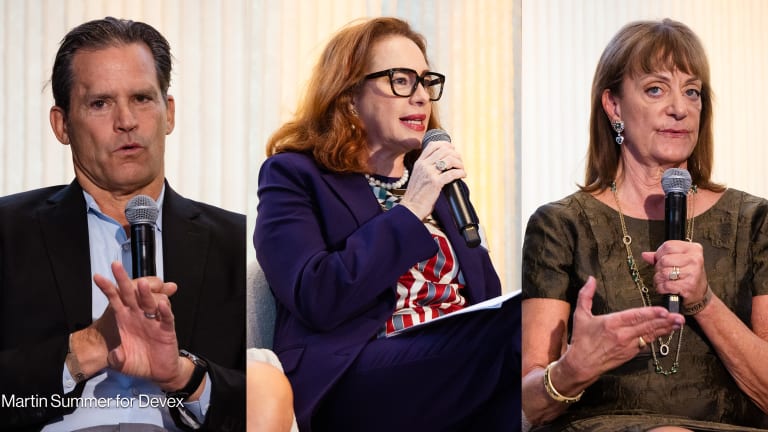6 ways business practices can make NGOs more effective
Emulating business best practices could not only make NGOs more effective, but could also eventually enable the private and nonprofit sectors to create new business models together. How? Accenture Development Partnerships global programs director shares her tips with Devex.
Through years of collaboration with the private sector, development nonprofits have learned business best practices that they can adopt to create and improve efficiencies in their organizations, be it in the way they handle staffing concerns or deliver projects. The private sector is constantly innovating and finding ways to increase efficiencies, however. And while nongovernmental organizations themselves are finding innovative ways to do business better and more efficiently, they continue to look at the private sector as well to see which best practices they have yet to emulate. After all, according to the global programs director of international development management consultancy Accenture Development Partnerships, emulating business best practices could not only make global development NGOs more effective, but it could also eventually enable the private and nonprofit sectors to create new business models together. Speaking to Devex on the sidelines of the Bond annual conference in London last week, Louise James gave her top six tips for global development organizations to take from business, and painted a vision of a future where a fourth sector will emerge that will be inhabited by hybrid business models. 1. Scale your work. “Commoditize” is a word rarely spoken in the international development sector. But James suggested it should be used more. NGOs should assess new market opportunities, she said, looking at what products and services they offer, developing business models, rolling them out and scaling them as quickly as possible, in the same way businesses do. Noting the need to adapt work to local cultural contexts, she suggested the development sector should think about which elements are replicable. To ensure projects can be scaled, James recommended that NGOs “start with the end in mind” and “stage-gate as you go along to see if you have enough core elements in there that you can adapt for other countries.” A project between the Amref Health Africa and Vodafone to develop mobile training for community health workers is one such example. “The core technology is pretty plug and play,” James said, explaining that Vodafone built a mezzanine platform with scale in mind from the start, and is now considering how to use the model beyond Kenya. 2. Improve knowledge management and sharing. In her 10-year experience working with development professionals, James said she has seen many effective individuals, but perhaps fewer effective organizations. And this, James believes, is because nongovernmental organizations are not managing and sharing knowledge effectively enough. “I’ve seen the C-drive of people I work with is full of wonderful documents, proposals, insights and thought pieces,” she said. “But how often is that actually institutionalized within an organization and shared? Particularly in the humanitarian context when you see a lot of staff turnover, it becomes increasingly important to put a good structure in place to be able to get the best out of the fantastic knowledge that you have.” 3. Embrace technology for data collection and analytics. While there are tech-savvy global development NGOs that stay abreast of the latest data collection, management and analytics technologies, many of them do not. Their reasons are varied — they may not have the budget to invest in these technologies, for example, or perhaps they might have strict security protocols that prevent early adoption. But James stressed that using technology to gather data and analyze performance can help NGOs increase their effectiveness, pointing to the way the corporate sector has transformed its business over the past five years simply by using social, mobile, analytics and cloud services. “There’s a huge amount that the public sector can learn and apply,” she said. “They need to get on that journey, because there’s great potential to increase the effectiveness of the way you work through leveraging technology in a better way.” 4. Improve your internal effectiveness. Beyond improving data collection and management, and knowledge sharing, nongovernmental organizations need to enhance the way they function internally. Over the years, James has seen nonprofits fail to invest in their staff, which is an often costly mistake. It takes a lot of time and effort to recruit team members who not only have the right skills to perform the tasks required but who also fit well with the organization’s culture. But James found that many nonprofits have not taken the time to nurture staff, noting that the number of organizations conducting performance management and investing in employee training is “frighteningly low.” “It’s important these things are looked at so staff feel valued to develop their careers as they move up into leadership roles, and that they are supported and trained in order to be successful in their jobs,” she said. 5. Look at outcomes not overheads. In an environment marked by fiscal challenges and donor belt-tightening, it is understandable for NGOs to cut costs wherever they can. But they need to be smarter about where they economize, and make sure they don’t risk losing efficiencies in the quest for savings. “If we’re thinking about how effective we are, we cannot ignore outcomes over cost,” James said. Donors emphasize value for money, and the way for NGOs to win more funding is not just to show how far they can stretch their development dollars but to also show how much they’ve achieved toward meeting their — and more importantly, the donors’ — development goals. 6. Forge hybrid business models. At some point, James believes the NGO-private sector partnership will reach a “tipping point” where the end goal of the collaboration will be too complex to achieve given current arrangements. When this happens, NGOs and corporates will have to create new business models from scratch that will focus not only on generating financial, social and environmental impact but also on delivering positive social goods at scale and profit. A report by Accenture, “The Convergence Continuum,” defines this arrangement as the creation of a fourth sector. With these new arrangements, which James refers to as hybrid models, NGOs could play more of an advisory role, providing suggestions on how businesses can reach the bottom of the pyramid or invest in development projects more effectively, for instance. But to achieve hybrid models, James said NGOs must begin by building trust with the corporates they’ve formed partnerships with so that these businesses can see them as trusted partners with credibility as an adviser. One good example of this, she explained, is how Oxfam currently advises Unilever on business models around smallholder farmers. “You can’t just go into a corporate and say, ‘Hey, we’ve got a great new business model for you,’” James said. “You’ve got to build that relationship where they see actually you do have insights, credibility and expertise that they need. Then, rather than just working together, you can talk about setting up a new business model that will spin out a new entity further down the line.” Check out more insights and analysis provided to hundreds of Executive Members worldwide, and subscribe to the Development Insider to receive the latest news, trends and policies that influence your organization.
Through years of collaboration with the private sector, development nonprofits have learned business best practices that they can adopt to create and improve efficiencies in their organizations, be it in the way they handle staffing concerns or deliver projects.
The private sector is constantly innovating and finding ways to increase efficiencies, however. And while nongovernmental organizations themselves are finding innovative ways to do business better and more efficiently, they continue to look at the private sector as well to see which best practices they have yet to emulate.
After all, according to the global programs director of international development management consultancy Accenture Development Partnerships, emulating business best practices could not only make global development NGOs more effective, but it could also eventually enable the private and nonprofit sectors to create new business models together.
This story is forDevex Promembers
Unlock this story now with a 15-day free trial of Devex Pro.
With a Devex Pro subscription you'll get access to deeper analysis and exclusive insights from our reporters and analysts.
Start my free trialRequest a group subscription Printing articles to share with others is a breach of our terms and conditions and copyright policy. Please use the sharing options on the left side of the article. Devex Pro members may share up to 10 articles per month using the Pro share tool ( ).
Gabriella Jóźwiak is an award-winning journalist based in London. Her work on issues and policies affecting children and young people in developing countries and the U.K. has been published in national newspapers and magazines. Having worked in-house for domestic and international development charities, Jóźwiak has a keen interest in organizational development, and has worked as a journalist in several countries across West Africa and South America.








